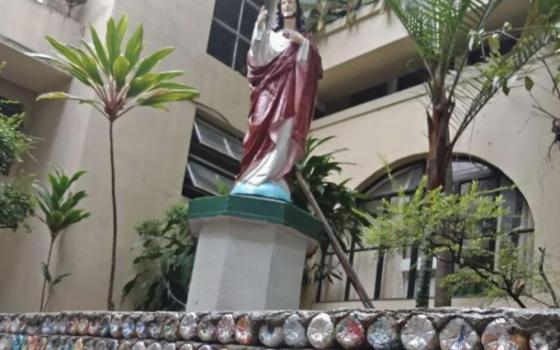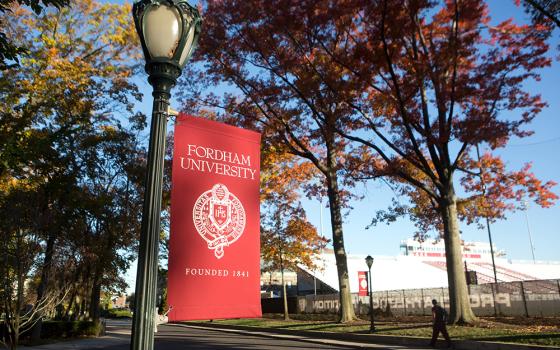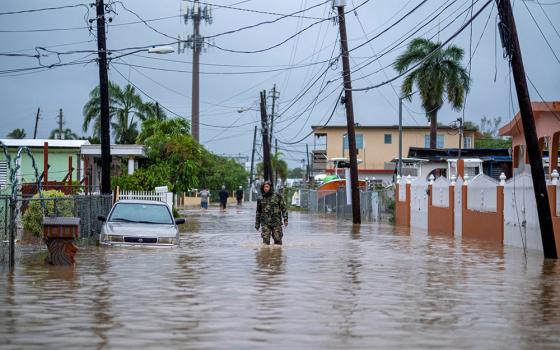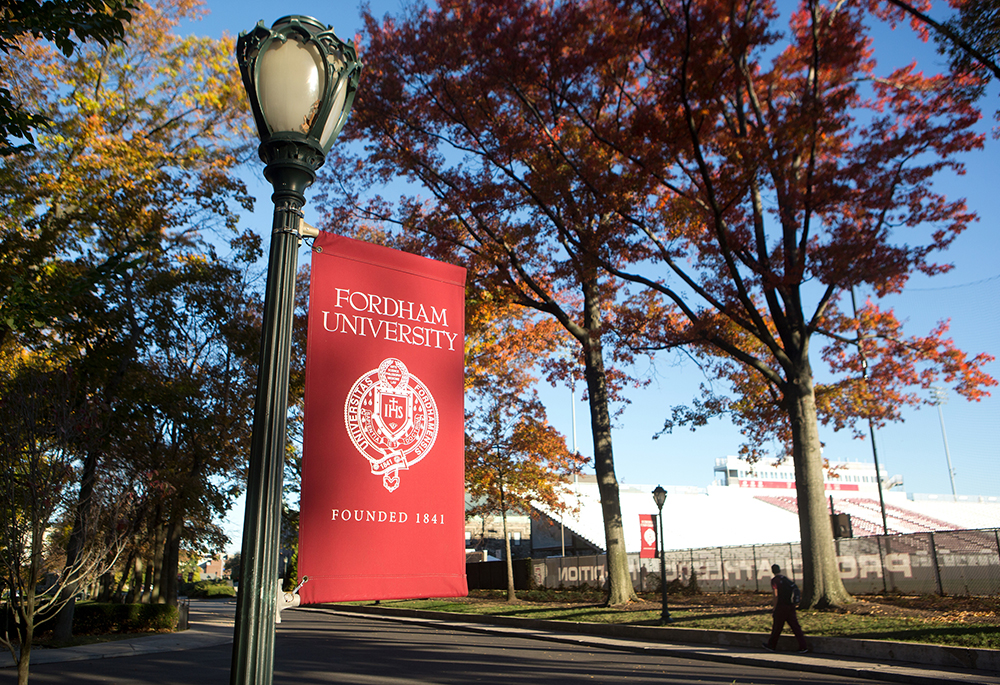
Fordham University is one of 11 institutions nationwide selected for the U.S. Environmental Protection Agency's Environmental Justice Thriving Communities Grantmaking Program. (CNS/Fordham University/Michael Falco)
The largest grant ever awarded to Fordham University in its 183-year history is set to funnel millions of federal dollars to community organizations undertaking environmental justice projects across the Bronx and beyond.
The Catholic and Jesuit school is one of 11 institutions nationwide selected for the U.S. Environmental Protection Agency's Environmental Justice Thriving Communities Grantmaking Program. Most, including Fordham, received a $50 million grant to manage and distribute to community groups across the country and U.S. territories that are working to address air pollution, food access, toxic cleanups, adaptation to climate change, and other environmental and sustainability challenges.
Fordham celebrated its inclusion in the Thriving Communities program April 8 as part of a daylong climate action summit at its Bronx campus that included Senate Majority Leader Chuck Schumer, D-N.Y., and U.S. Rep. Ritchie Torres among the attendees.
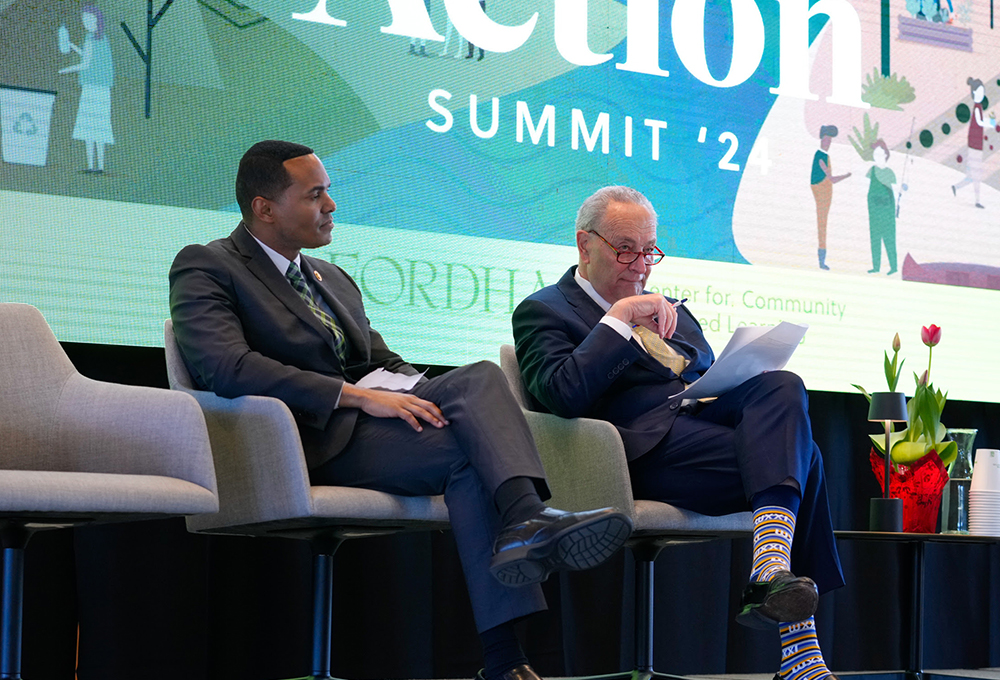
Senate majority leader Chuck Schumer, D-NY, and U.S. Rep. Ritchie Torres attend a daylong climate action summit at Fordham University's Bronx campus April 8. (Courtesy of Fordham University)
"As Pope Francis has reminded us, there is no issue more urgent to the world than the ways that we care for our Earth, our home," said Fordham president Tania Tetlow at the climate summit. "That we get to be part of helping, seeding the ideas and scaling the innovation and ingenuity of communities on the frontlines [of climate change] who help us find the answers is a source of such pride for us as we do this work together."
Schumer called the EPA grant award "the beginning of a great success. This is a red letter day for Fordham and for environmental justice in New York and here in the Bronx."
The $600 million for the Thriving Communities program was allocated to the EPA through the Inflation Reduction Act, the nation's largest-ever investment (upwards of $300 billion) in climate change solutions, clean energy and environmental justice. The historic law directed $3 billion to the EPA for grants and funding to historically disadvantaged communities for projects to address pollution, build climate resiliency and access clean energy.
Those investments are part of the Biden administration's Justice40 Initiative that mandates at least 40% of federal spending related to climate, clean energy, pollution, housing and more go toward communities which have been historically underinvested and overburdened by pollution.
The Thriving Communities program aims to get funds quickly and more easily to the groups working directly to address such issues.
Since the environmental justice movement's beginnings in the 1980s, grassroots groups have been at the forefront of many of the efforts to limit pollution in communities, with some led by Catholics like Hazel Johnson, who advocated against toxic pollution on Chicago's South Side, and Sharon Lavigne and other Catholic women in southern Louisiana who are resisting petrochemical facilities near their homes in an area referred to as "Cancer Alley."
"This is a red letter day for Fordham and for environmental justice in New York and here in the Bronx."
— Senate Majority Leader Chuck Schumer, D-N.Y.
Fordham will serve as regional grantmaker for EPA Region 2, which covers New York, New Jersey, Puerto Rico, the U.S. Virgin Islands and eight federally recognized Indian nations.
The $50 million grant is the largest the school has received, though Fordham will serve only as a conduit for the majority of the funds.
Subgrants will range from $75,000 to $350,000, with the goal of distributing $40 million to 200 organizations over a three-year period. Roughly $10 million of the grant will go directly to Fordham to hire a grantmaking team and build support structures. Applications for the subgrants are tentatively expected to open as early as June, with the first round of grants then awarded in September. Community groups can find more information, including how to apply, at www.fordham.edu/fic.
Fordham's Center for Community Engaged Learning is leading its EPA grantmaker program — called Flourishing in Community — alongside five partner organizations that will assist in outreach and support to community groups.
Julie Gafney, the center's executive director and project lead for the EPA program, called it "a dream come true" for Fordham to be able to use its infrastructure and experience in managing grants to support community-led programs addressing things like improving waterway access, conservation and cleanup projects, expanding green space, and workforce development for clean energy and other green economy jobs.
Advertisement
The grantmaking initiative is part of the school's seven-year plan under the Laudato Si' Action Platform, a Vatican initiative for Catholic institutions at all levels to take sustainability-focused actions in response to Francis' 2015 encyclical "Laudato Si', on Care for Our Common Home."
Gafney, who developed Fordham's Laudato Si' action plan and chairs its sustainability council, told EarthBeat she sees the pope calling Catholics to focus not just on individual actions to address ecological challenges like climate change, but also to orient responses around environmental justice that centers communal approaches.
"We need to be building solutions in diverse intersectional communities," she said, what she sees as "a true call to arms" for Catholic institutions like Fordham. "And that's really the only way we're going to be able to achieve the kind of lasting change that is so desperately needed."
When the 11 grantmakers were announced in December, EPA administrator Michael Regan called the Thriving Communities program — created in 2023 as the EPA's first-ever grantmaking program for environmental justice — a response to community advocates who for years have called for federal support and resources to help address environmental justice concerns they are facing.
"Together, in partnership with these Grantmakers, we are taking a giant step toward a future where every person in America has equal opportunity to breathe clean air, drink clean water, and live a healthy, productive life," Regan said in a statement.
"Together, in partnership with these Grantmakers, we are taking a giant step toward a future where every person in America has equal opportunity to breathe clean air, drink clean water, and live a healthy, productive life."
— EPA administrator Michael Regan
One of the goals of the Thriving Communities program is to eliminate barriers to federal funds that have long existed for small community groups. For many, the application process has been complex, confusing and time consuming.
Language access and upfront costs for projects when funding only offers reimbursement have been other roadblocks for small organizations, Gafney said.
At Fordham, the team has sought to streamline the application process and provide related information in the 10 most commonly spoken languages in each of the states and territories it will oversee. A community leadership board, composed of people outside Fordham, will make funding determinations.
Alongside its partner organizations, Fordham plans to host weekly information and application workshops, as well as provide grant recipients with support through resources and teams of faculty, graduate students and community leaders.
The five partner organizations are New York Immigration Coalition, New Jersey Alliance for Immigrant Justice, Puerto Rico-based ConPRmetidos, Community Foundation of the Virgin Islands and Business Initiative Corporation of New York.
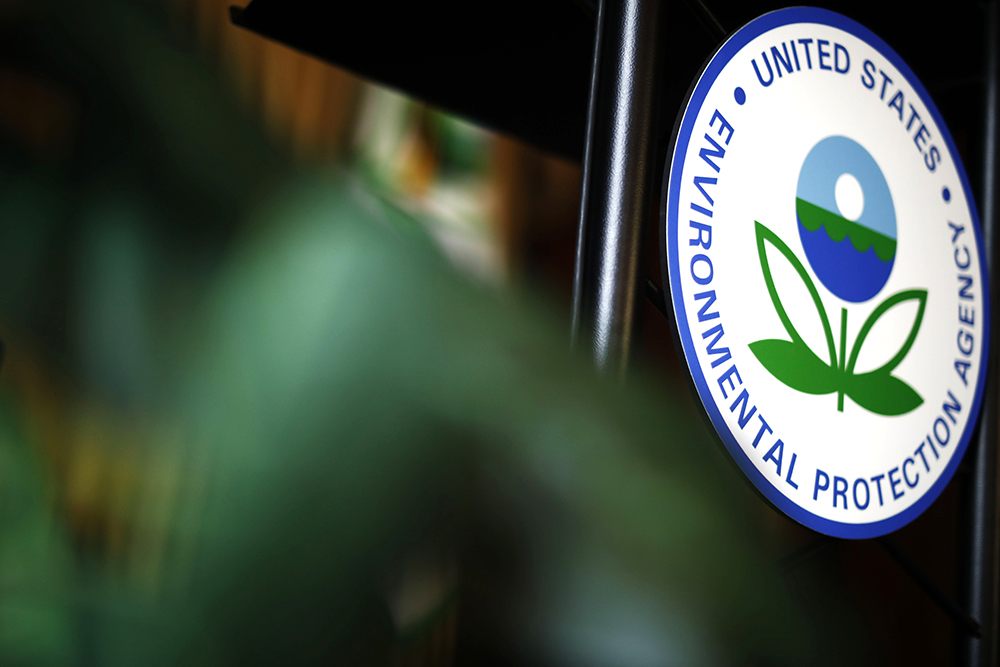
The U.S. Environmental Protection Agency's sign is seen on the podium at EPA headquarters in Washington July 11, 2018. (OSV News/Reuters//Ting Shen)
Being situated in the Bronx has put Fordham in close connection with a number of community groups and environmental justice advocates working to alleviate the impacts of pollution in an area that ranks last among New York's 62 counties in public health outcomes. Among them is Ayana Elizabeth Johnson, a marine biologist and co-founder of Urban Ocean Lab, who delivered the keynote address at the climate action summit.
The Jesuit school also has ties to Puerto Rico and the U.S. Virgin Islands through study abroad experiences that have worked with community leaders in both Caribbean locales to address ecological justice issues and develop sustainability projects.
One shared challenge across EPA Region 2 areas is coastlines, where communities are working to protect lands and build resilience from rising sea levels driven by rising global temperatures.
While Fordham has been taking steps toward sustainability on its campus — like installing a solar array and tracking local air quality — the school sees the EPA grantmaking program as a way to heed Francis' calls to move its environmental work beyond the campus ecosystem and into the communities that are facing the brunt of pollution and climate impacts.
"This is gonna be a way for us to rethink what teaching and learning and research can mean for an institution that centers social responsibility," Gafney said.






